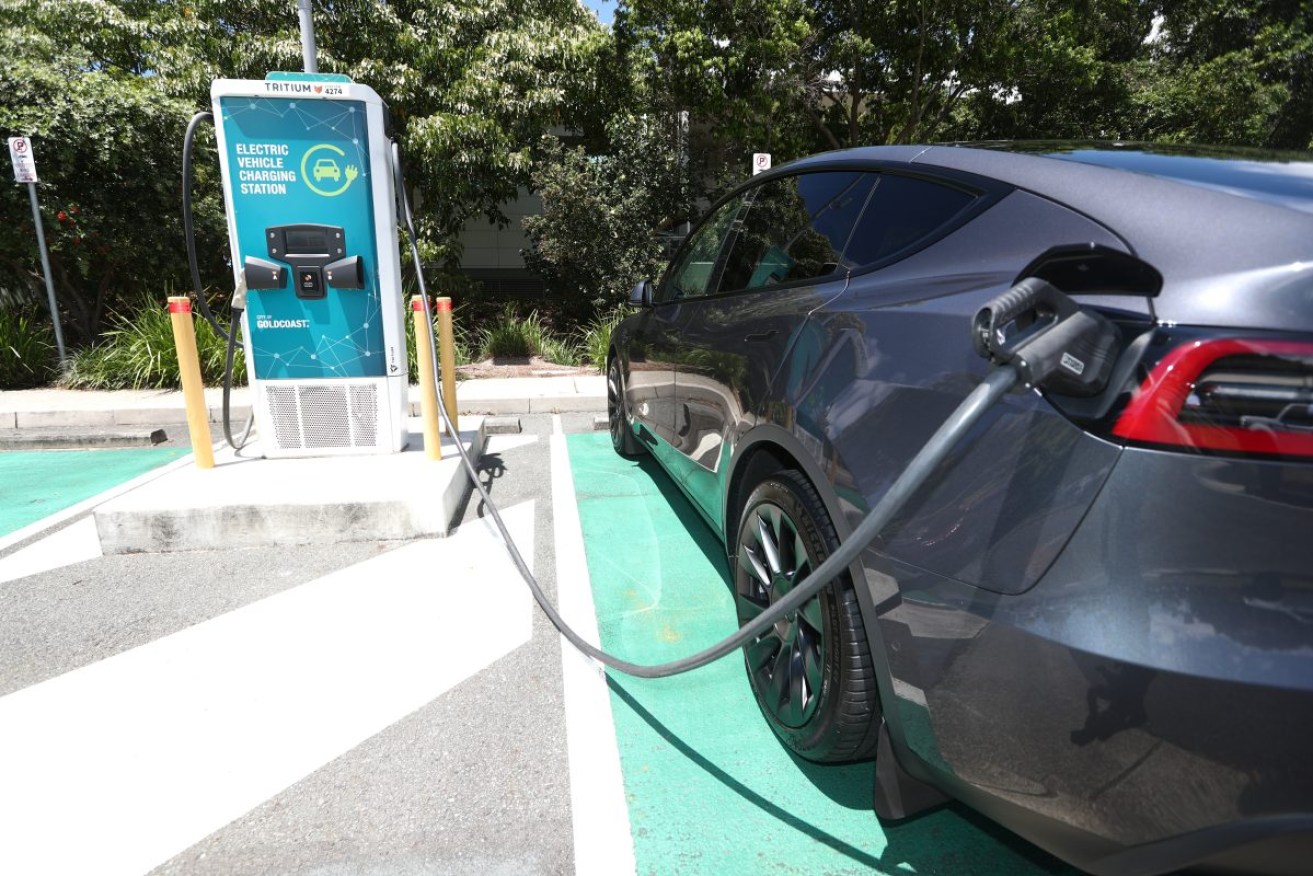SA rollout for electric car charging network
Adelaide, the Hills and South-East will host 12 “fast-charge” electric vehicle charging stations under a $12m state government grant, with plans to expand the rollout to 140 stations across the state by the end of next year.

An electric vehicle charging station. Photo: AAP
The 140 “fast charging” stations will be powered by renewable energy and made up of 86 AC stations capable of up to 7kW output, 54 DC rapid stations capable of up to 150kW output, and ultra-rapid stations capable of up to 200kW output.
Construction of all 140 sites is expected to be complete by the end of next year.
The state government has given the RAA a $12.35 million grant to support the construction of the first 12 charging stations, which will be located at Marion, West Lakes, Strathalbyn, Hahndorf, Woodside, Mount Gambier and five Adelaide CBD UParks.
Across those first 12 sites, 59 charging plugs are already available.
It is hoped the statewide network will boost the uptake of electric vehicles (EVs) and reduce South Australia’s carbon emissions.
The network is also anticipated to remove a common barrier to EV purchase by ensuring people can travel with the assurance that a charging station is close by.
RAA chief executive Nick Reade said within the 140 sites there would be about 500 plugs or charging points.
He said it takes about 10 minutes to charge a vehicle at ultra-rapid stations and 15 to 20 minutes at DC stations.
“Three out of every four of our charging stations will be in regional locations,” Reade said.
“We’ll be in Mount Gambier, we’ll be in Bordertown and Berri and Renmark on the east, all the way up to Marla in the north, across to the Ceduna in the west.
“Every part of South Australia will be covered with these electric vehicle charging stations.”
The RAA says it costs about $16 to charge a typical EV at an AC charger, compared to about $86 for a petrol-powered vehicle.
Charging EVs at DC and ultra-rapid chargers is about double the cost of AC chargers.
Reade said the RAA would introduce “time of use charging”, meaning the cost of charging a vehicle would depend on whether it is being charged during peak or off-peak periods.
“RAA feels like we can really add value to the whole ecosystem by helping our members and the community at large understand the benefits of charging at different times of the day,” he said.
“We think we can educate and communicate very well with all EV users to make sure that they know the right time of day to be charging to optimise the cost for them and ultimately the stability of the grid as well.”
InDaily reported last year that sales of new EVs in South Australia had increased by over 200 per cent compared to 2021, while petrol car sales dropped by eight per cent.
Electric car sales jumped from 149 in 2021, to 502 in 2022. Hybrid car sales rose from 3324 to 3807 in the same period, while plug-in hybrid vehicle (PHEV) sales rose by 110 to 193.
In January this year, 242 EVs were sold in South Australia, up from 32 in the same month last year.
Premier Peter Malinauskas said Australia had been “behind the rest of the pack” on EV take-up, but demand was growing.
He said the government expected an acceleration of the take-up of EVs over the next decade.
“This transition (to EVs) is going to happen to Australian motorists whether they like it or not because quite simply, overseas manufacturers are increasingly making decisions to end production of combustion engine motor vehicles and transitioning at an ever-quicker pace to EVs,” he said.
“We’ve got to start making the investments to facilitate that and make it as convenient as we possibly can for motorists.”
Malinauskas said in 2022, 70 per cent of all of the energy produced in South Australia came from renewable sources – more than in any other state.
He said the decarbonisation of transportation was the next step towards a greener future.
It comes after the state government last month repealed the electric vehicle tax and introduced a $3000 subsidy for the purchase of EVs.




